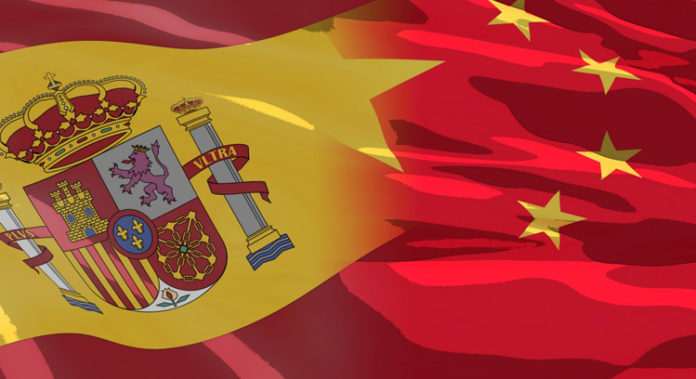· The Central European trains (Yixinou)
connecting Yiwu and Madrid have operated about 570 trains in the past four
years and shipped nearly 46,000 standard containers.
· Spain's 13 autonomous regional
governments, major seaports and inland ports have established cooperative
relations with “Yixinou” to participate in the construction of the train.
· The Port of Valencia is the
largest port in the Mediterranean and will be an important gateway for China to
strengthen its economic ties with Spain and throughout Europe.
· The two countries have
successfully built a number of projects in the Middle East, Africa, Latin
America and other places through financing and technical cooperation.
The two sides should strengthen
cooperation in economy, trade, tourism, and third-party markets within the framework
of the "Belt and Road" to promote the comprehensive strategic
partnership between China and Spain to a new level in the new era.
Local time on the evening of
November 27, when President Xi Jinping met with King Felipe VI of Spain, he
expressed his ardent expectations for the establishment of the “Belt and Road”
between China and Spain, which encouraged the entrepreneurs of the two
countries. They all expressed their belief that
President Xi’s visit will bring more favorable news to the economic and trade
cooperation between the two countries and open up more room for development.
In recent years, Spain, which ranks
among the top in the economic growth rate in developed countries, has benefited
from economic and trade cooperation with China. Today, bilateral trade volume
has exceeded the USD 30 billion mark. Spain is an indispensable economic and
trade partner of China in Europe. China is also Spain's largest trading partner
outside the EU. The “One Belt, One Road” link is connecting more and more
Chinese and Spanish people to jointly write a new chapter on the ancient Silk
Road.
On November 28th, along with the
train whistle, a Central European train of "Yi Xinou" carrying
Spanish goods such as red wine, maternity products, high-end kitchen utensils,
sanitary ware, motor oil and auto parts, drove out of the Madrid Abronica
freight train station. It headed to Yiwu, China. Just a few days ago, this
train just brought products of "Made in China" from Yiwu, such as
daily necessities, clothing, luggage, hardware, and home appliances.
Now, "Yixinou" maintains
three trading trip per week from Yiwu to Madrid and one trading trip per week
from Madrid to Yiwu. The trade has become “reciprocal." Spain's
13 autonomous regional governments, major seaports and inland ports have
established cooperative relations with Yixinou and participated in the
construction of the class.

In 2017, Yiwu’s imports from Spain
reached USD10.105 million, a year-on-year increase of 106.97%. In the words of
Juan Lazaro, vice chairman of the Federation of Spanish Entrepreneurs, “Central
European trains (Yixinou) is creating opportunities in Spain.” Located in
southeastern Spain, Valencia is an important silk production and trading center
in the history of Spain. Currently, the port of Valencia
is the port with the largest container throughput in the Mediterranean region,
with a region covered by a radius of 350 km accounting for more than 55% of
Spain's gross domestic product (GDP). The Director
of the Port Authority of Valencia, Aurelio Martinez, told reporters that
"almost 50% of Spain's total import and export with China is carried out
through the port of Valencia."
“The
Chinese team brings advanced management concepts and management models which bringing
new opportunities to the port city of Spain and bringing benefits to the
people,” said Mar Chao, director of the strategic development department of
Valencia Port. In the first 10 months of this year,
Noatum Port Company completed a total of 3.031 million TEUs, an increase of 12.8%.
Among them, the completion of 326,000 TEUs in May created the highest container
record in the month since its establishment. On July
1 this year, Noatum Port Company established a railway service company,
connecting the Spanish port and the hinterland by rail, creating a new
transportation hub to allowing more goods to be transported from Spain to the
EU.
"At present, the Company had
416 employees, of which only three Chinese expatriates Together with more than
1,000 service outsourcing, we have created a total of more than 1,500 local
jobs." said CEO of Noatum Port Company Sun Kai. "Strengthening
economic and trade exchanges with China has become our consensus. The Port of
Valencia hopes to become an important gateway for China to strengthen economic
ties with Spain and even Europe as a whole," Martinez said.
In recent years, China and Spain companies
have successfully built batches of projects in the Middle East, Africa, and
Latin America through financing, division of labor, technical cooperation, and
formation of a consortium. Mendes, Secretary of Ministry of Industry, Trade and
Tourism of Spain, said: "The third-party market will be the top priority
for cooperation between the two countries. China and Spain companies have
complementary advantages in various fields, which can not only strengthen third
parties in Latin America and Africa. The cooperation of the market can also
jointly develop other countries and regions along the 'Belt and Road'.
“Spain construction companies have
strong technical strength and rich experience in management and operation. They
are leading the implementation of several large-scale infrastructure projects
in the world and are leading the international rankings of many industries,” said
Peña, CEO of the Spanish Foreign Trade and Investment Promotion Agency. The
cooperation of the China and Spain in the third-party market is conducive to
the double improvement of the “quantity” and “quality” of bilateral
cooperation.
News
source from: